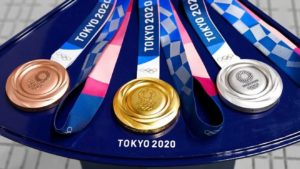E-Waste to Olympic Medals
The 2020 Tokyo Olympic Games have kicked off, after a twelve month delay due to COVID-19 restrictions. After four years of intentions to use recycled precious metals in every award, the Tokyo Olympic organizing committee announced its medal-making campaign. This campaign asked members of the public to donate discarded devices, such as old smartphones and digital cameras to create new medals for the 2020 games. The Olympics require over 5,000 medals for its contestants, and organizers targeted 2,700kg of bronze, 30.3kg of gold, and 4,100kg of silver to be collected by the public. By the time the campaign ended in March of 2019, the goal amount for each medal had been reached.

The “Tokyo 2020 Olympic and Paralympic medals will be made out of people’s thoughts and appreciation for avoiding waste. I think there is an important message in this for future generations,” stated Olympic gold medalist, Kohei Uchimura. Not only does this pave the way for sustainability in future Olympics, but it has also been implemented in past Olympic Games. At the 2016 Rio Olympics, thirty percent of the sterling silver used to make the medals were extracted from old car parts, X-ray plates, or mirror surfaces that were recycled materials. Noting the prior success, the Tokyo Olympic committee set a goal to create all the medals from recycled materials.
Currently, the electronics market has seen an influx in the amount of obsolete components. The rapid pace of new technologies result in high turnover as consumers buy the latest and greatest electronics. For the 2020 Olympic Games, the trend of sustainability has been praised and will hopefully continue in the coming years. Converge is excited to see innovations with old technologies and sustainability within the 2020 Olympic and Paralympic Games. Let’s solve the future together!
Read more: Tokyo Games Awards First Gold Made From Recycled Electronics | Digital Trends